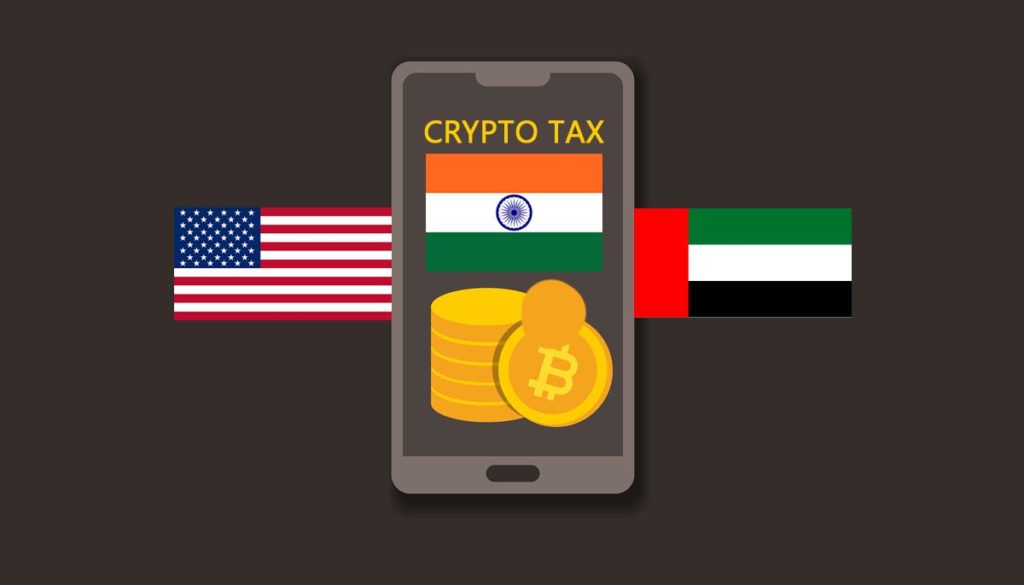
The world of cryptocurrencies has caught the attention of Indian investors in recent years. The rising value of Bitcoin, Ethereum and other cryptocurrencies has opened new doors of possibilities for investors. But, the 30% tax on cryptocurrencies in India has forced investors to face new challenges.
In this article, we will analyze the status of crypto tax in Dubai and the US compared to India and understand whether this tax is lower there than in India. Have a look at the key details and learn about the crypto tax system in the USA and UAE below.
Crypto Tax in India: The Reality of 30%
The Indian government has taken a big step towards regulating cryptocurrencies by taxing them. In the Union Budget for the financial year 2022-23, Finance Minister of Indian announced that income from crypto assets will be taxed at 30%. Apart from this, 1% TDS (tax deduction at source) has also been implemented, which will be deducted on every transaction. The main objective of this stringent tax policy is to bring transparency in the crypto market and prevent illegal activities.
However, this decision has disappointed many investors. The 30% tax rate is quite high, which further increases the risk associated with crypto. This has led many investors to move abroad to countries with better tax rules and facilities. The two top countries that Indians liked to move abroad are UAE (Dubai) and the USA!
Crypto Tax in Dubai (UAE): Investors’ Paradise
Dubai, which is part of the United Arab Emirates (UAE), has become a favorite destination for global investors. The main reason for this is its tax-free policies. Dubai currently does not levy any personal income tax or capital gains tax on cryptocurrencies. However, business entities have to pay 9% corporate tax, but the rate is zero for individual investors.
The Dubai government has offered several incentives to promote crypto and blockchain technology. Special economic zones such as the Dubai Multi Commodity Center (DMCC) have introduced attractive schemes to attract crypto companies. Thus, Dubai has become an attractive option for crypto investors who are keen to avoid India’s stringent tax rules.
Crypto Tax in the US: A Complex System
The tax policy on cryptocurrencies in the US is quite different from India and Dubai. The US Internal Revenue Service (IRS) considers cryptocurrency as an asset, and capital gains tax is levied on it. Tax rates vary depending on your income and the holding period. Short-term gains (assets held for less than a year) can be taxed at a rate ranging from 10% to 37%, while long-term gains (assets held for more than a year) are taxed at a rate ranging from 0% to 20%.
So based on the long term and short term duration, the USA government imposes taxes on crypto income which can be from 0-20% in long term case and 10-37% in short term case. Here’s complete breakdown on Capital Gains Tax Rates in USA:
- Short-Term Capital Gains (Held < 1 year): Taxed at your ordinary income tax rate, which can range from 10% to 37% depending on your income bracket.
- Long-Term Capital Gains (Held > 1 year): Taxed at preferential rates:
- 0% for taxpayers in the lowest income brackets.
- 15% for most taxpayers.
- 20% for high-income taxpayers.
In addition, various state and local taxes may also apply to cryptocurrencies in the US, making the tax system more complex. Although the US tax rates are more flexible than India, especially for long-term investors, this tax policy is not entirely favorable for Indian investors and that’s why many people demand tax deduction.
Is Dubai or the US better?
The absence of taxes in Dubai is certainly attractive compared to India’s 30% crypto tax. Dubai’s tax-free policy and crypto-friendly environment make it an ideal location. However, it is important to note that living and doing business in Dubai has its own advantages and disadvantages. For instance, the cost of living and lifestyle in Dubai may prove to be expensive for some Indian investors.
On the other hand, the tax rates on cryptocurrencies in the US are flexible, but the complex tax system and various legal requirements there may make it difficult for Indian investors to take full advantage.
Conclusion
The 30% crypto tax in India has created new challenges for investors. The tax situation in Dubai and the US looks comparatively more favorable, but local conditions and legal requirements must also be taken into account. It is important for Indian investors to make their investment decisions only after careful and thorough analysis.
With the help of tax planning and financial advisors, they can better manage their investment strategy. In the fast-changing world of cryptocurrencies, investing wisely is the key to success.





